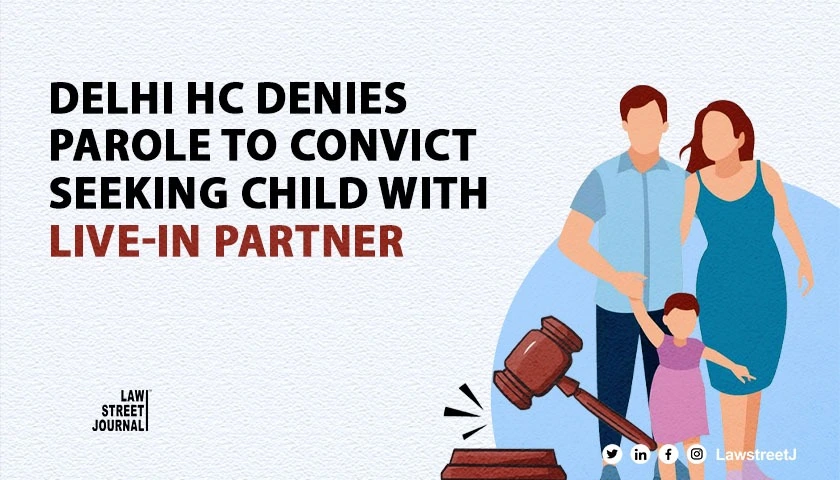NEW DELHI: The Delhi High Court, recently, denied the parole request of a married convict who wanted to establish a conjugal relationship with his live-in partner.
The court held that a woman whose legally wedded husband is still alive and with whom she already has three children cannot claim to have a fundamental right to have a child with her live-in partner, who is a convict. Further, it also held that granting parole in such circumstances would establish a problematic precedent, leading to numerous similar petitions.
In this Court's opinion, granting parole on the ground to have a child or to maintain conjugal relationships with a live-in partner, where the convict already has a legally wedded wife and children born out of that wedlock, would set a harmful precedent. In case parole is granted on such grounds, it will open a floodgate of such petitions where many convicts may seek parole on the ground that they have a live-in partner apart from their legally wedded partner or in the case of an unmarried convict, a live-in partner who may want to have a child with the convict. In this Court's opinion, this cannot be permitted within the parameters of existing law as well as the relevant rules for grant of parole under the Delhi Prison Rules, 2018. The Court said while rejecting the parole request.
Additionally, while referring to Kundan Singh v. State (NCT of Delhi), wherein the court has permitted the convict to be released on parole for the purpose of procreation also clarified that the right to procreation, covered under Article 21 of the Constitution of India, cannot be termed as an absolute right.
FACTS:
The present writ petition has been filed by the petitioner seeking setting aside of order vide which the respondents rejected the application seeking a grant of parole to the petitioner to consummate his marriage with his wife and to maintain other social ties.
ARGUMENTS:
The counsel for the petitioner argued that the petitioners wife has expressed her intent to start a family with the petitioner and that she has been deprived of her right to have progeny, even though she has not committed any offence.
It was further argued that the denial of having a conjugal relationship with his wife will adversely affect the rights of his wife. It is also stated that denying parole to the petitioner will adversely affect his ability to maintain social ties.
However, the counsel for the State while opposing the writ petition argued that the present petition has been filed on false and frivolous grounds as Ms. T is not the wife of the petitioner. Further, the counsel argued that the petitioner was already married to one Ms. A from whom he was not yet separated. Hence, he argued that the petition should not be allowed.
DECISION:
After hearing both parties the court framed three issues:
(i) Whether the petitioner is guilty of concealment of facts and not approaching the Courts with clean hands?
(ii) Whether a live-in partner be covered under the definition of family as provided under Rule 1201 of Delhi Prison Rules, 2018 for the grant of parole?
(iii) Whether a convict is entitled to a grant of parole on the grounds of maintaining conjugal rights and procreation with his live-in partner when he already has a legally wedded wife?
The court after the perusal of the records held that the petitioner has not come to this Court with clean hands, as he did not reveal that Ms. T is not his wife, but second wife/live-in partner. It was also not revealed to this Court that the petitioner has not separated legally from his first wife Ms. A, with whom he has three children.
Further, the court while dealing with the second issue held that the live-in partner of the petitioner herein, who lacks legal recognition as a wife or a spouse, cannot be held to fall within the scope of the definition of family under Delhi Prison Rules.
Lastly, the court while dealing with the third issue held, that he is not entitled to a grant of parole, on grounds of procreation or maintaining conjugal relationships with his second wife/live-in partner, when he already has a legally wedded wife, as well as three children born out of that wedlock.
In conclusion, the court dismissed the petition for a grant of parole and also held that since the law does not permit a grant of parole on the ground of maintaining a conjugal relationship even with ones legally wedded wife then it can not do it for a live-in partner who lacks legal recognition.


![Delhi High Court Sets Aside Arbitral Tribunal's Award Against NHAI in Highway Project Delay Case [Read Judgment]](/secure/uploads/2023/07/lj_9605_23374c2e-392c-4491-a2fe-f2f12fc5272f.jpg)
![Delhi Court Rejects Stay Request in Defamation Case Against Rajasthan CM Ashok Gehlot [Read Order]](/secure/uploads/2023/08/lj_5208_80de1ddc-d76a-4f7f-b180-408e3ae14fb4.jpg)





